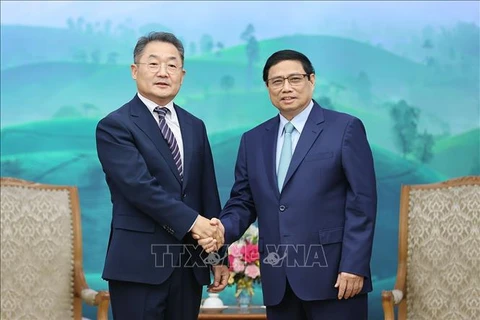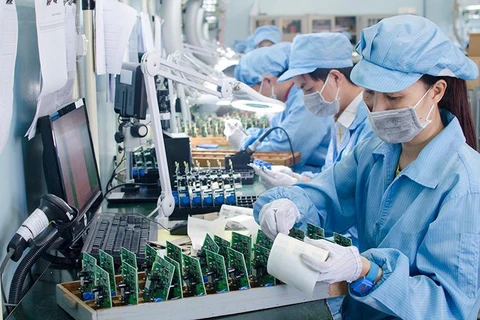 Associate Prof. Nguyen Thu Thuy, Director of the Higher Education Department under the Ministry of Education and Training (Photo: VietnamPlus)
Associate Prof. Nguyen Thu Thuy, Director of the Higher Education Department under the Ministry of Education and Training (Photo: VietnamPlus) Hanoi (VNA) – Preferential policies such as scholarships, tuition exemptions, and credit support are necessary to attract talented students and train lecturers for the semiconductor sector amid a shortage of human resources, said Associate Prof. Nguyen Thu Thuy of the Ministry of Education and Training.
Thuy said that 50 foreign firms have invested in Vietnam’s microelectronics and semiconductor industry. After the US President's visit, more large-scale enterprises are expected to invest in Vietnam, leading to a higher demand in human resources for microchip design.
Economists from Fulbright University predicted that the semiconductor industry will need about 20,000 workers with university degree or higher in the next five years and about 50,000 in 10 years.
Currently, Vietnam has about 5,000 people working in microchip design. Meanwhile, human resources training demand in this industry in the next few years is about 3,000 people per year, of which the number of postgraduates is expected to account for at least 30%, said Thuy.
She said that Vietnam's leading engineering and technology universities are relatively ready in terms of training capacity to meet human resource requirements in the field of semiconductors and microchips.
The official cited data from the Ministry of Education and Training which show the number of newly recruited university students in majors suitable to the industry is about 6,000 per year. The number of graduates is about 5,000 students per year, an average increase of 7% per year. The majors with connections to the industry recruit about 15,000 new students each year, while the number of graduated students is about 13,000 each year, an average rise of 10% per year.
Thus, if 30% of students in suitable majors and 10% of related majors are trained for the semiconductor sector, the number of 3,000 graduates per year is feasible, she affirmed.
However, the official underlined that the biggest challenge in the work is how to recruit enough students for these majors and enhance the quality of training for the emerging sector.
In this context, the Ministry of Education and Training has designed three major groups of policies to attract students to the semiconductor sector, Thuy said.
The first group includes policies to support and encourage students to choose majors related to semiconductors. The aim is to recruit at least 1,000 postgraduate students.
The second is the group of policies regarding investment in enhancing training and research capacity. This includes the capacity of lecturers, laboratory equipment and software tools for practice, experimentation and simulation.
The third is the group of policies to promote cooperation among universities, research institutes, and domestic and foreign businesses. This includes universities and businesses in the US with the potential to invest in Vietnam, said Thuy.
The official said that if policies, and thus, signals from the market about human resource needs in the semiconductor industry are consistent, student awareness will improve significantly. Universities will no longer have to worry about student recruitment.
She revealed that with an aim to develop human resources for the sector, the Ministry of Education and Training are working on two projects to propose to the Prime Minister within this year. They focus on developing high quality human resources for technology sectors, and building a number of excellent research and training centres on 4.0 technology, she added./.























